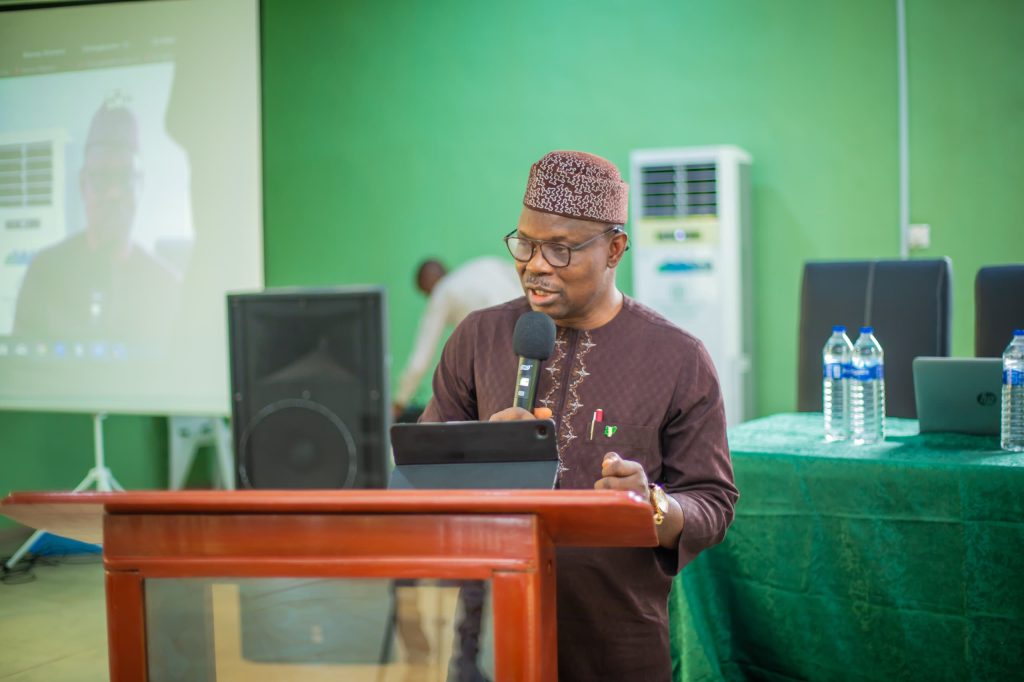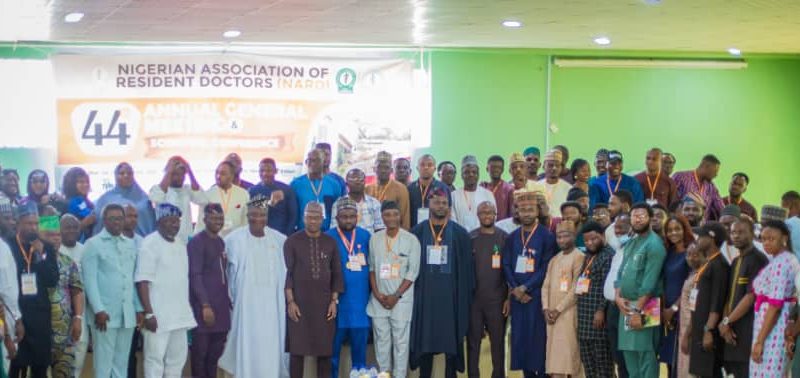Salako Says Workforce, System Must Be Upgraded To Mitigate Against The Effect of Climate Change On Health Sector
The Minister of State for Environment, Dr. Iziaq Adekunle Salako, has said that he health system and workforce in our country must be adequately equipped and upgraded to mitigate and adapt to climate change in the face of the increasing public challenges being faced globally due to extreme weather events. He made this call in Abeokuta, the capital of Ogun State on Friday, September 27, 2024, at the 44th Annual General Meeting and Scientific Conference of the National Association of Resident Doctors. The Minister who spoke on “Building a Resilient Health Workforce and Embracing Climate-centric Innovations” noted that Resident Doctors are the lubricants that keep the engine of specialised medical services running in our country and indeed all over the world. He however added that doctors being at the hierarchy of the workforce for our health system on the laps of whom final clinical decisions often fall require to be well equipped with the capacity to withstand or recover quickly from difficult conditions.
He said the health workforce is a critical part of the health system whose resilience continues to be tested by events such as pandemics like COVID-19, man made disasters like wars and extreme weather events which are now being seen more frequently because of the phenomenon of climate change. When these disruptive events occurs, ensuring the continuation and upscaling vital healthcare services to reduce injuries, disabilities and death, the Minister noted, is a function of the level of the resilience of the healthcare workforce and system.

“The world including our country Nigeria is faced with more frequent and intense extreme weather events such as severe and widespread flooding, large storms, recording breaking heat waves, long droughts, severe wildfire, coastal erosion, hurricanes and so on. Using a combination of climate models, space-based observations and historical records from as far back as the 1800s, scientists have been able to conclusively link the increasing extreme weather events to climate change occasioned by global warming. In 2024, these weather extremes appears to be occurring across the world at a level never seen before with many climate scientists saying they can not remember ever seeing such level of climate disasters and human suffering.
“This prevailing trajectory of climate change is posing an existential threat to humanity, sustainable development, planetary health and affecting the vulnerable groups disproportionately. According to the WHO (2023), tne overall health costs of climate change amount to $2 billion–$4 billion and is projected to further escalate over time, reaching $54 trillion for a 1.5°C increase and $69 trillion or a 2°C increase by 2100 (WHO 2023a).
“The challenges posed to the health system and workforce by climate change requires the strengthening of the system to mitigate and adapt. Apart from shifting disease patterns with increase incidence of respiratory diseases, heat-related illnesses, heart diseases and the spread of vector-borne diseases like malaria, Lyme, and dengue, water and food related illnesses like cholera, gastroenteritis, campylobacter, leptospirosis and salmonellosis, climate change is also directly causing injuries and deaths and has been linked to increases in violent crime and overall poor mental health (USEPA, 2024). According to WHO (2015), Under high emission scenarios, 400 million people in Nigeria are projected to be at risk of malaria by 2070, diarrhea disease in children under 15 attributable to climate change is projected to be almost 10% by 2030 and heat related deaths in the elderly 65 years and above is projected to increase to about 80 per 100,000 annually by 2080 compared to the baseline of 3 as at 1990.
“The loss of livelihoods, displacement and food insecurity from climate disasters also exposes the people to malnutrition and higher risk of many diseases. With almost 60% of all existing infectious diseases affecting human beings being aggravated by climatic hazards (Vaccineworks, 2023), its effect in exacerbating NCDs including mental illnesses and the high potential for injuries and death, climate change is not just an environmental challenge but also a profound public health threat, a disease burden amplifier and illness potentiator. It increases healthcare demand especially the need for acute care but also reduces healthcare accessibility, adversely affect healthcare supply sometimes by damaging facilities, reduce workforce access and put more pressure on health workers”, the Minister said.
He said the current flooding being experienced in our country is a litmus test, a gantlet to the resilience of our health system and our abilities to respond collaboratively across sectors to address the health challenges of climate change and extreme weather events. He said it is a clarion call to us that its better to act to mitigate climate change and not wait until such catastrophe occurs.

He said it has become expedient that in strengthening the resilience of our health care system, we must adopt climate centric innovations and climate-proof the system.
“In 3 decades of the UNFCC conference of parties, COP 28 held in Dubai in 2023 hosted the first-ever Health Day and beamed search light on the neglected yet catastrophic health impacts of climate change. The Health Day culminated in the endorsement of the UAE Declaration on Climate and Health by 120 countries including Nigeria. The declaration is a call to strengthen cross sectoral collaboration to curb greenhouse emissions, enhance finance for climate and health solutions, build climate-resilient health systems, and maximize the health benefits of climate action”.
He said Nigeria recognises the challenges posed by climate change to public health, the health system and health workforce and is putting measures in place for mitigation and adaptation.
“Nigerian Government has started incorporating climate change considerations into various health policies and plans. This includes linking health outcomes to climate resilience in strategic documents like the National Health Policy and National Health Sector Strategic Plan, establishing surveillance systems to monitor climate-sensitive health issues, such as vector-borne diseases which will help to identify and respond to outbreaks more effectively, promoting policies and frameworks focused on disaster risk reduction including health emergency preparedness and prioritizing the importance of addressing health impacts arising from climate-related disasters.
“The Nigeria’s National Climate Change Policy outlines commitment to addressing climate change, including health impacts, and emphasizes integrating climate change considerations into national and sectoral planning while our National Adaptation Strategy and Plan of Action on Climate Change (NASPA-CC) is enhancing the country’s resilience to climate impacts, specifically prioritizing vulnerable sectors such as health.
“In climate proofing our health system and building resilient health workforce, we need to reduce health value chains’ carbon emissions, mitigate their impact on nature, and adapt to climate change while also safeguarding the critical public health outcomes they support. To accelerate investments in climate and health and provide a platform to consolidate policies and practices at the nexus of climate change and health will require collaboration, the incubation of scalable innovation, capacity building, advocacy, and knowledge across governments and societies. Key guiding principles to achieve the above includes prioritizing climate resilient health development, building sustainable and low-carbon health systems that deliver high-quality health care, decarbonizing the health care supply chain, mobilizing finance for resilient, low-carbon, sustainable health systems and facilitating collaboration on human, animal, and climate health challenges using the one health approach”.
He said healthcare workers are at the frontline of responding to climate induced public health challenges and the need to expand their climate related health competencies can not be overemphasized for effective adaptive frameworks.
“Relevant training to enhance the capacity and capability of health workforce to respond to climate induced health emergencies and healthcare needs including providing climate-related health education is therefore critical. Incorporating teaching on the intersection between climate change and health for CPDs as well as in medical school, nursing schools and raising climate and health specialists is a compelling need of the new world order of extreme weather events. To reduce the magnitude, control adverse effects and manage post extreme weather events, environmental health officers should also be well integrated into frontline response”.
Salako who is a Medical Doctor spoke about the need for industrial harmony and job satisfaction as well as workforce retention. He said a healthcare system that frequently suffers strikes and industrial disharmony can not be regarded as resilient. He added that when the system is unable to retain well trained staff for reasonable length of time, its resilience becomes challenged.
“I wish to recognize that governments and hospitals management are not free of blame in the scenario of frequent strikes being witnessed in our health system. However, as leaders of the healthcare sector, we need to also recognise that frequent strikes in the sector is alienating doctors and other health care professionals from the people. The public is gradually becoming insensitive and unconcerned when we go on strike. The power of strike lies in public sympathy and once the populace starts to see our strikes as routine and one of those things, we need to go back and rethink our strategies by ensuring strict compliance to a standard of minimum service even during strikes”.
On the exodus of medical practitioners seeking better lives abroad otherwise known as japa syndrome, Salako said it is another social factor that is negative to the resilience of our health system.

“While I recognise that it is our fundamental right to seek happiness and job satisfaction anywhere in the world where we can find it, I must appeal to our sense of patriotism to stay and join hands in building the country which has invested a lot on most of us. We should not be turning our back on the country. Times are tough no doubt but let me assure you all the Federal government of Nigeria under the leadership of President Bola Ahmed Tinubu is tougher and resolute to win the war against the hard time and bring back the good old days of economic prosperity. The President is determined to significantly improve power generation, transmission and distribution, massively ramp up infrastructure, promote access to capital, eliminate multiple taxation, diversity the economy and encourage value addition and export. The whole idea is to increase local production without which our economy can not be turned around. I want to assure this gathering today that President Tinubu is committed, he is capable and with the support of Nigerians, he will turn around the fortunes of our country for the better”.
The Minister said the health workforce can make or mar any health system irrespective of the quality of the supportive infrastructure.
“Quoting the WHO, there is no health without a health workforce. In the face of the increasing public challenges being faced globally due to extreme weather events, it has become imperative that the health system and workforce in our country is equipped to mitigate and adapt to climate change. This is a collective duty of government, administrators, NGOs and individual health workers. Let us therefore join hands to climate-proof and build the resilience our system for the benefit of our people”.




